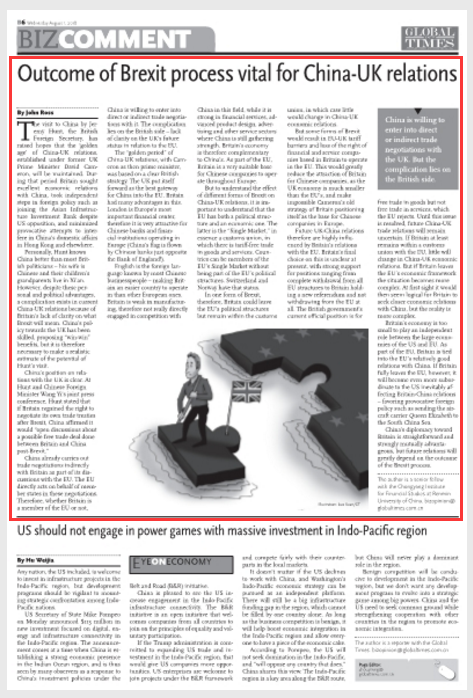Commentaries
Your Present Location: Teacher_Home> John Ross> CommentariesOutcome of Brexit process vital for China-UK relations
By John Ross Source: Global Times Published: 2018-7-31
The visit to China by Jeremy Hunt, the British Foreign Secretary, has raised hopes that the 'golden age' of China-UK relations, established under former UK Prime Minister David Cameron, will be maintained. During that period Britain sought excellent economic relations with China, took independent steps in foreign policy such as joining the Asian Infrastructure Investment Bank despite US opposition, and minimized provocative attempts to interfere in China's domestic affairs in Hong Kong and elsewhere.

Personally, Hunt knows China better than most British politicians - his wife is Chinese and their children's grandparents live in Xi'an. However, despite these personal and political advantages, a complication exists in current China-UK relations because of Britain's lack of clarity on what Brexit will mean. China's policy towards the UK has been skilled, proposing "win-win" benefits, but it is therefore necessary to make a realistic estimate of the potential of Hunt's visit.
China's position on relations with the UK is clear. At Hunt and Chinese Foreign Minister Wang Yi's joint press conference, Hunt stated that if Britain regained the right to negotiate its own trade treaties after Brexit, China affirmed it would "open discussions about a possible free trade deal done between Britain and China post-Brexit."
China already carries out trade negotiations indirectly with Britain as part of its discussions with the EU. The EU directly acts on behalf of member states in these negotiations. Therefore, whether Britain is a member of the EU or not, China is willing to enter into direct or indirect trade negotiations with it. The complication lies on the British side - lack of clarity on the UK's future status in relation to the EU.
The "golden period" of China-UK relations, with Cameron as then prime minister, was based on a clear British strategy. The UK put itself forward as the best gateway for China into the EU. Britain had many advantages in this. London is Europe's most important financial center, therefore it is very attractive for Chinese banks and financial institutions operating in Europe (China's flag is flown by Chinese banks just opposite the Bank of England!).
English is the foreign language known by most Chinese businesspeople - making Britain an easier country to operate in than other European ones. Britain is weak in manufacturing, therefore not really directly engaged in competition with China in this field, while it is strong in financial services, advanced product design, advertising and other service sectors where China is still gathering strength. Britain's economy is therefore complementary to China's. As part of the EU, Britain is a very suitable base for Chinese companies to operate throughout Europe.
But to understand the effect of different forms of Brexit on China-UK relations, it is important to understand that the EU has both a political structure and an economic one. The latter is the "Single Market," in essence a customs union, in which there is tariff-free trade in goods and services. Countries can be members of the EU's Single Market without being part of the EU's political structures. Switzerland and Norway have that status.
In one form of Brexit, therefore, Britain could leave the EU's political structures but remain within the customs union, in which case little would change in China-UK economic relations.
But some forms of Brexit would result in EU-UK tariff barriers and loss of the right of financial and service companies based in Britain to operate in the EU. This would greatly reduce the attraction of Britain for Chinese companies, as the UK economy is much smaller than the EU's, and make impossible Cameron's old strategy of Britain positioning itself as the base for Chinese companies in Europe.
Future UK-China relations therefore are highly influenced by Britain's relations with the EU. Britain's final choice on this is unclear at present, with strong support for positions ranging from complete withdrawal from all EU structures to Britain holding a new referendum and not withdrawing from the EU at all. The British government's current official position is for free trade in goods but not free trade in services, which the EU rejects. Until this issue is resolved, future China-UK trade relations will remain uncertain. If Britain at least remains within a customs union with the EU, little will change in China-UK economic relations. But if Britain leaves the EU's economic framework the situation becomes more complex. At first sight it would then seem logical for Britain to seek closer economic relations with China, but the reality is more complex.
Britain's economy is too small to play an independent role between the large economies of the US and EU. As part of the EU, Britain is tied into the EU's relatively good relations with China. If Britain fully leaves the EU, however, it will become even more subordinate to the US inevitably affecting Britain-China relations - favoring provocative foreign policy such as sending the aircraft carrier Queen Elizabeth to the South China Sea.
China's diplomacy toward Britain is straightforward and strongly mutually advantageous, but future relations will greatly depend on the outcome of the Brexit process.
The author is a senior fellow with the Chongyang Institute for Financial Studies at Renmin University of China.























































































 京公网安备 11010802037854号
京公网安备 11010802037854号





